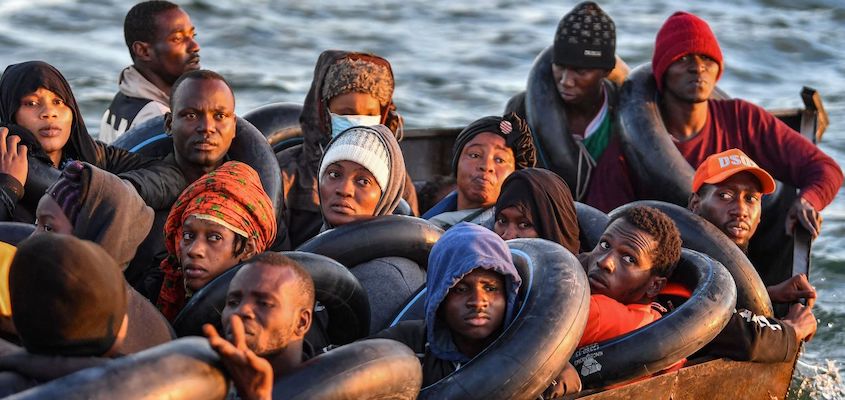The UK-Rwanda Pact to Keep Migrants from Crossing the English Channel
TRANSCEND MEMBERS, 17 Jul 2023
Ann Garrison | Black Agenda Report – TRANSCEND Media Service
12 Jul 2023 – The UK is spearheading a European drive to outsource migrants to Rwanda.
UK officials have been trying to ship African and Middle Eastern migrants to Rwanda since June 2022 despite successful legal challenges mounted by immigrant rights advocates, including intervention by the European Court of Human Rights .
At the end of June, three UK Court of Appeal judges said Rwanda could not be considered a “safe third country” where migrants from any country could be sent, but the government has vowed to appeal .
One thing is clear about this policy. Its real purpose is to stop migrants from crossing the English Channel for fear of being deported to Rwanda. Imagine making it all the way across the Mediterranean, then Southern Europe, then the English Channel, only to wind up where? In Rwanda, the second most densely populated nation in Africa and one of the most politically repressive.
That might seem like enough to keep migrants on the French side of the Channel or drive them to seek refuge elsewhere in Europe, but Denmark has already signed a deal with Rwanda on transporting migrants to Rwanda and sought EU collaboration in sending asylum seekers outside the block. The European Union already pays Libyan militias to stop migrants, force them into dangerous detention centers, and send them to Rwanda .
I spoke to Rwandan opposition leader Victoire Ingabire Umuhoza about the UK and the rest of Europe offloading migrants to Rwanda. Ingabire spent eight years in a Rwandan prison after her failed attempt to run for president in 2010. She is now a political prisoner, not confined to her home as previously, but unable to leave Rwanda and frequently summoned for interrogation by authorities.
Ann Garrison: Victoire, you’ve said that deporting migrants to Rwanda violates international law. Why is that?
Victoire Ingabire Umuhoza: It violates the UN refugee convention that asserts that a refugee should not be returned to a country where they face serious threats to their life or freedom.
AG: The European Union is paying to stop migrants in Libya and send them to Rwanda. What happens to them when they get there? Do you have any idea what percentage actually stay to become permanent residents or citizens of Rwanda, and what percentage are deported back to their home countries or resettled elsewhere in Africa?
VIU: These are refugees who temporarily stay in Rwanda waiting to be resettled anywhere else. This arrangement has been agreed on by the Rwandan Government, the African Union, and the United Nations High Commissioner for Refugees (UNHCR). The European Union provides for living expenses of the refugees in transit while they are waiting to be resettled. Thus, these refugees stay in a special place with better living conditions than Burundian and Congolese refugees who’ve crossed Rwanda’s borders and live in camps.
Between September 2019 and today, 1500 refugees from Libya have been received in Rwanda. Nine hundred of them have been resettled to other African countries. I have not heard of any of them having been deported or given permanent residence permits in Rwanda.
AG: Regarding the migrants sent from the UK, the BBC reports, “They may be granted refugee status to stay in Rwanda. If not, they can apply to settle there on other grounds, or seek asylum in another ‘safe third country.’” What would they face if they stayed in Rwanda?
VIU: Rwanda does not have enough jobs for its own people let alone Britain’s migrants. So many young Rwandans do not have jobs that it will not be possible to find work for others, and I doubt that these migrants will have enough money to set up their own businesses. And they would face severe state repression if they ever protested government policies here.
AG: Why do you think Rwandan officials agreed to this policy? Is it anything more than what’s been called a “grubby cash for humans” plan, in which the UK and the EU both pay large sums of money to Rwanda for handling their problem?
VIU: Prior to the Commonwealth Heads of Government Meeting (CHOGM) that took place in Rwanda last year, the United Kingdom had harshly and publicly criticized and condemned the Rwandan government’s human rights violations. However, since both governments agreed on that asylum deal, the British government has abstained from criticizing the Rwandan government.
Instead, British officials are often heard praising Rwanda as a safe country that has achieved remarkable progress. I am not suggesting that the British government or any partner of Rwanda shouldn’t praise Rwanda’s progress, but the British government’s sudden change in communication is an indication that the Rwandan government, by entering into these deals with its development partners, gains from not being criticized for its lack of respect for human rights and the rule of law as well as for its disregard for democratic values in Rwanda. So it is not only about money.
AG: Is there anything else you’d like to say about this?
VIU: My country has unsolved problems with Rwandan refugees who are afraid to return to Rwanda. There are more than 250,000 Rwandan refugees across the world who cannot return because they feel Rwanda is not a safe country for them. The majority of these refugees have settled in neighboring countries. This situation has created political tensions with our neighbors, leading to border closures with both Burundi and Uganda. Today Rwanda is not on good terms with the Democratic Republic of the Congo (DRC) partly due to the issue of Rwandan refugees there.
In my opinion, before the Rwandan government focuses on taking asylum seekers deported from the UK, it needs to tackle the core issues that lead Rwandans to flee and fear to return home.
First and foremost, it needs to take the necessary steps to divorce Rwandan politics from violence, removing all social and political incentives for dissident groups to take up arms or do politics in exile.
To achieve this, the Rwandan government must enter into an inclusive and open dialogue with its dissenting voices and Rwandan refugees from across the board. It should use this dialogue to draft governance reforms that would guarantee political inclusion, respect for human rights and the rule of law in Rwanda, and that can be supported by all stakeholders. Rwanda’s development partners, such as the UK, should encourage and support such a process.
Last week’s British court decision that the UK and Rwanda immigration plan is unlawful is not what the British government expected.
The British government has learned something out of this decision and understands that it is time to support the Rwandan government to engage in political dialogue with its dissenting voices so that a better, safer political system can be implemented in Rwanda.
_______________________________________________
 Ann Garrison is an independent journalist based in the San Francisco Bay Area. She attended Stanford University and is a member of the TRANSCEND Network for Peace Development Environment. In 2014 she received the Victoire Ingabire Umuhoza Democracy and Peace Prize for her reporting on conflict in the African Great Lakes region. She can be reached at @AnnGarrison, ann@anngarrison.com.
Ann Garrison is an independent journalist based in the San Francisco Bay Area. She attended Stanford University and is a member of the TRANSCEND Network for Peace Development Environment. In 2014 she received the Victoire Ingabire Umuhoza Democracy and Peace Prize for her reporting on conflict in the African Great Lakes region. She can be reached at @AnnGarrison, ann@anngarrison.com.
Go to Original – blackagendareport.com
Tags: Africa, Europe, Human Rights, Migrants, Refugees, Rwanda, UK
DISCLAIMER: The statements, views and opinions expressed in pieces republished here are solely those of the authors and do not necessarily represent those of TMS. In accordance with title 17 U.S.C. section 107, this material is distributed without profit to those who have expressed a prior interest in receiving the included information for research and educational purposes. TMS has no affiliation whatsoever with the originator of this article nor is TMS endorsed or sponsored by the originator. “GO TO ORIGINAL” links are provided as a convenience to our readers and allow for verification of authenticity. However, as originating pages are often updated by their originating host sites, the versions posted may not match the versions our readers view when clicking the “GO TO ORIGINAL” links. This site contains copyrighted material the use of which has not always been specifically authorized by the copyright owner. We are making such material available in our efforts to advance understanding of environmental, political, human rights, economic, democracy, scientific, and social justice issues, etc. We believe this constitutes a ‘fair use’ of any such copyrighted material as provided for in section 107 of the US Copyright Law. In accordance with Title 17 U.S.C. Section 107, the material on this site is distributed without profit to those who have expressed a prior interest in receiving the included information for research and educational purposes. For more information go to: http://www.law.cornell.edu/uscode/17/107.shtml. If you wish to use copyrighted material from this site for purposes of your own that go beyond ‘fair use’, you must obtain permission from the copyright owner.
